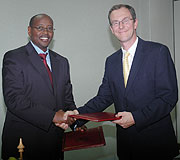NYARUGENGE - THE United Kingdom (UK) has approved a combined sectoral and direct budget support of Rwf 153 billion (£160 million) to finance Rwanda’s expenditure programs for the next three years.


NYARUGENGE - THE United Kingdom (UK) has approved a combined sectoral and direct budget support of Rwf 153 billion (£160 million) to finance Rwanda’s expenditure programs for the next three years.
Direct budget support will take the biggest chunk of this amount totaling Rwf 100 billion (£107million) to be spent over the next three years. The remainder will finance different sectoral projects across the country.
The signing ceremony of the grant took place yesterday at the Ministry of Finance between Minister James Musoni and Martin Leach, the head of DFID-Rwanda.
In his remarks, Musoni appreciated the support and said that the model of budget support strengthens national ownership of programs and reduces transaction costs.
The minister said that the funds will go directly in the implementation of Rwanda’s Economic Development and Poverty Reduction Strategy (EDPRS).
"The British government has for long been channeling a big percentage of its support through general budget support and this places the government of Rwanda in the best position to execute its five-year strategic plan,” Musoni said.
He promised proper management of the funds given the existing public financial management mechanism to ensure that the money benefits the targeted people.
Musoni highlighted three flagships in EDPRS to benefit from the support, including economic growth, social protection targeting the weaker parts of the community through Vision 2020 Umurenge and good governance.
On his part, Leach said that his government chose to provide funding through budget support because of Rwanda’s considerable progress and improvements in public financial management systems and institutional capacity and a remarkable successful development of government’s tax revenue systems.
"We acknowledge that budget support is the government’s preferred aid modality; by making aid more predictable and giving Rwanda the responsibility to choose how it is allocated,” Leach said.
He hailed Rwanda’s debate of becoming self sufficient as demonstrated in this year’s budget where for the first time more than half of the budget is being internally financed.
"While I am proud that DFID is contributing today to the Rwanda’s poverty reduction programme, I hope that in 15, perhaps 20 years, a future representative of DFID will not need to sign a similar MoU. I hope Rwanda will have continued its path towards self sufficiency,” he said.
The focus of UK bilateral assistance is on poverty reduction, key sectors like education, agriculture and land reform as well as support for the public financial management.
During the 2009-2010 financial year DFID will dispatch £33 million as direct budget support.
Ends


